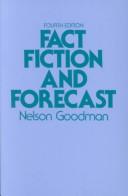
ISBN: 0674290712 0674290704 Year: 1983 Publisher: Cambridge, Mass. Harvard University Press
Abstract | Keywords | Export | Availability | Bookmark
 Loading...
Loading...Choose an application
- Reference Manager
- EndNote
- RefWorks (Direct export to RefWorks)
Here, in a new edition, is Nelson Goodmans provocative philosophical classica book that, according to Science, raised a storm of controversy when it was first published in 1954, and one that remains on the front lines of philosophical debate. How is it that we feel confident in generalizing from experience in some ways but not in others? How are generalizations that are warranted to be distinguished from those that are not? Goodman shows that these questions resist formal solution and his demonstration has been taken by nativists like Chomsky and Fodor as proof that neither scientific induction nor ordinary learning can proceed without an a priori, or innate, ordering of hypotheses.
Logic --- Philosophy of science --- wetenschapsfilosofie --- logica --- Conditionals (Logic) --- Forecasting --- Induction (Logic) --- Possibility --- Science --- -Natural science --- Science of science --- Sciences --- Philosophy --- Inductive logic --- Logic, Inductive --- Reasoning --- Forecasts --- Futurology --- Prediction --- Conditional statements (Logic) --- Grammar, Comparative and general --- Forecasting. --- Possibility. --- Conditionnels (Logique) --- Prévision --- Induction (Logique) --- Possibilité --- Philosophy. --- Philosophie --- -Philosophy --- -Logic --- Natural science --- Prévision --- Possibilité --- -Inductive logic --- Normal science --- Wetenschapsfilosofie --- Logica
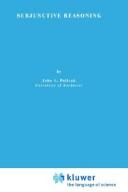
ISBN: 9027707014 9401015023 9401015007 9789027707017 Year: 1976 Volume: 8 Publisher: Dordrecht Reidel
Abstract | Keywords | Export | Availability | Bookmark
 Loading...
Loading...Choose an application
- Reference Manager
- EndNote
- RefWorks (Direct export to RefWorks)
Logic --- Philosophy of language --- Mathematical logic --- Conditionals (Logic) --- Reasoning --- Probabilities --- Conditionnels (Logique) --- Raisonnement --- Probabilités --- Counterfactuals (Logic) --- Argumentation --- Ratiocination --- Reason --- Thought and thinking --- Judgment (Logic) --- Probability --- Statistical inference --- Combinations --- Mathematics --- Chance --- Least squares --- Mathematical statistics --- Risk --- Contrary-to-fact conditional --- Counterfactual conditionals --- Conditional statements (Logic) --- Grammar, Comparative and general --- Probabilities. --- Reasoning. --- Conditionals (Logic). --- Counterfactuals (Logic). --- Probabilités
Book
ISBN: 0672613476 0672518899 2707306973 2707306975 9780672613470 9780672518898 Year: 1973 Publisher: Indianapolis (Ind.): Bobbs-Merrill
Abstract | Keywords | Export | Availability | Bookmark
 Loading...
Loading...Choose an application
- Reference Manager
- EndNote
- RefWorks (Direct export to RefWorks)
Induction (Logic) --- Conditionals (Logic) --- Possibility --- Forecasting --- Science --- Philosophy --- Conditionals (Logic). --- Forecasting. --- Induction (Logic). --- Possibility. --- Philosophy. --- Induction (Logique) --- Conditionnels (Logique) --- Possibilité --- Prévision --- Sciences --- Philosophie --- Normal science --- Philosophy of science --- Inductive logic --- Logic, Inductive --- Forecasts --- Futurology --- Prediction --- Conditional statements (Logic) --- Logic --- Reasoning --- Grammar, Comparative and general --- Science - Philosophy
Book
ISBN: 0333127560 9780333127568 Year: 1972 Publisher: London Macmillan
Abstract | Keywords | Export | Availability | Bookmark
 Loading...
Loading...Choose an application
- Reference Manager
- EndNote
- RefWorks (Direct export to RefWorks)
Induction (Logic) --- Probabilities --- Belief and doubt --- Conditionals (Logic) --- Hume, David, --- Harrod, Roy, --- Evidence --- Probability --- Statistical inference --- Combinations --- Mathematics --- Chance --- Least squares --- Mathematical statistics --- Risk --- Proof --- Faith --- Logic --- Philosophy --- Truth --- Conditional statements (Logic) --- Grammar, Comparative and general --- Harrod, Roy Forbes Sir --- Hume, David --- ヒューム --- Probabilities. --- Induction (Logic). --- Inductive logic --- Logic, Inductive --- Reasoning --- Hume, David, - 1711-1776 --- Harrod, Roy, - 1900-1978 - Foundations of inductive logic
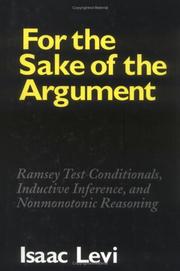
ISBN: 0521497132 9780521497138 9780511720161 9780521039017 0521039010 0511720165 Year: 1996 Publisher: Cambridge Cambridge University Press
Abstract | Keywords | Export | Availability | Bookmark
 Loading...
Loading...Choose an application
- Reference Manager
- EndNote
- RefWorks (Direct export to RefWorks)
This book by one of the world's foremost philosophers in the fields of epistemology and logic offers an account of suppositional reasoning relevant to practical deliberation, explanation, prediction and hypothesis testing. Suppositions made 'for the sake of argument' sometimes conflict with our beliefs, and when they do, some beliefs are rejected and others retained. Thanks to such belief contravention, adding content to a supposition can undermine conclusions reached without it. Subversion can also arise because suppositional reasoning is ampliative. These two types of nonmonotonic logic are the focus of this book. A detailed comparison of nonmonotonicity appropriate to both belief contravening and ampliative suppositional reasoning reveals important differences that have been overlooked.
Commonsense reasoning. --- Conditionals (Logic) --- Hypothesis. --- Induction (Logic) --- Inference. --- Nonmonotonic reasoning. --- Conditionals (Logic). --- Induction (Logic). --- Commonsense reasoning --- Hypothesis --- Inference --- Nonmonotonic reasoning --- Non-monotonic reasoning --- Reasoning --- Ampliative induction --- Induction, Ampliative --- Inference (Logic) --- Inductive logic --- Logic, Inductive --- Logic --- Assumption --- Supposition --- Science --- Conditional statements (Logic) --- Grammar, Comparative and general --- Common sense reasoning --- Methodology --- Induction (logique) --- Arts and Humanities --- Philosophy --- Philosophie --- Artificial intelligence --- Logique --- Knowledge representation

ISBN: 0521304113 0521071291 0511895976 9780511895975 9780521304115 9780521071291 Year: 1985 Publisher: Cambridge : Cambridge University Press,
Abstract | Keywords | Export | Availability | Bookmark
 Loading...
Loading...Choose an application
- Reference Manager
- EndNote
- RefWorks (Direct export to RefWorks)
This book develops in detail the simple idea that assertion is the expression of belief. In it the author puts forward a version of 'probabilistic semantics' which acknowledges that we are not perfectly rational, and which offers a significant advance in generality on theories of meaning couched in terms of truth conditions. It promises to challenge a number of entrenched and widespread views about the relations of language and mind. Part I presents a functionalist account of belief, worked through a modified form of decision theory. In Part II the author generates a theory of meaning in terms of 'assertibility conditions', whereby to know the meaning of an assertion is to know the belief it expresses.
Logic --- Lexicology. Semantics --- Conditionals (Logic) --- Truth --- Belief and doubt --- Psychology --- Conditionnels (Logique) --- Vérité --- Croyance et doute --- Psychologie --- 800.1 --- Conviction --- Philosophy --- Skepticism --- Certainty --- Necessity (Philosophy) --- Pragmatism --- Behavioral sciences --- Mental philosophy --- Mind --- Science, Mental --- Human biology --- Soul --- Mental health --- Conditional statements (Logic) --- Grammar, Comparative and general --- Doubt --- Consciousness --- Credulity --- Emotions --- Knowledge, Theory of --- Religion --- Will --- Agnosticism --- Rationalism --- Taalfilosofie --- Belief and doubt. --- Psychology. --- Truth. --- 800.1 Taalfilosofie --- Conditionals (Logic). --- Vérité --- Arts and Humanities
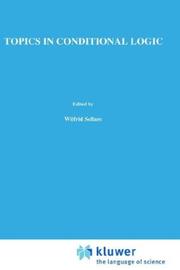
ISBN: 902771049X 9400989687 9400989660 9789027710499 Year: 1980 Volume: 20 Publisher: Dordrecht Reidel
Abstract | Keywords | Export | Availability | Bookmark
 Loading...
Loading...Choose an application
- Reference Manager
- EndNote
- RefWorks (Direct export to RefWorks)
Mathematical logic --- Conditionals (Logic) --- Modality (Logic) --- Semantics (Philosophy) --- Conditionnels (Logique) --- Modalité (Logique) --- Sémantique (Philosophie) --- Intension (Philosophy) --- Logical semantics --- Semantics (Logic) --- Semeiotics --- Significs --- Syntactics --- Unified science --- Language and languages --- Logic, Symbolic and mathematical --- Logical positivism --- Meaning (Psychology) --- Philosophy, Modern --- Semiotics --- Signs and symbols --- Symbolism --- Analysis (Philosophy) --- Definition (Philosophy) --- Modal logic --- Logic --- Nonclassical mathematical logic --- Bisimulation --- Conditional statements (Logic) --- Grammar, Comparative and general --- Conditionals (Logic). --- Modality (Logic). --- Semantics (Philosophy). --- Modalité (Logique) --- Sémantique (Philosophie)
Book
ISBN: 9048196086 9786612995699 1282995693 9048196094 9781282995697 Year: 2011 Publisher: Dordrecht, the Netherlands ; New York : Springer,
Abstract | Keywords | Export | Availability | Bookmark
 Loading...
Loading...Choose an application
- Reference Manager
- EndNote
- RefWorks (Direct export to RefWorks)
Belief revision theory and philosophy of science both aspire to shed light on the dynamics of knowledge – on how our view of the world changes (typically) in the light of new evidence. Yet these two areas of research have long seemed strangely detached from each other, as witnessed by the small number of cross-references and researchers working in both domains. One may speculate as to what has brought about this surprising, and perhaps unfortunate, state of affairs. One factor may be that while belief revision theory has traditionally been pursued in a bottom- up manner, focusing on the endeavors of single inquirers, philosophers of science, inspired by logical empiricism, have tended to be more interested in science as a multi-agent or agent-independent phenomenon.
Belief change. --- Science -- Philosophy. --- Science --- Belief change --- Physical Sciences & Mathematics --- Philosophy & Religion --- Sciences - General --- Philosophy --- Nonmonotonic reasoning. --- Conditionals (Logic) --- Knowledge, Theory of. --- Formalization (Philosophy) --- Epistemology --- Theory of knowledge --- Conditional statements (Logic) --- Non-monotonic reasoning --- Philosophy. --- Logic. --- Philosophy and science. --- Philosophy of Science. --- Form (Philosophy) --- Knowledge, Theory of --- Logic --- Methodology --- Psychology --- Grammar, Comparative and general --- Reasoning --- Argumentation --- Deduction (Logic) --- Deductive logic --- Dialectic (Logic) --- Logic, Deductive --- Intellect --- Thought and thinking --- Normal science --- Philosophy of science --- Science and philosophy
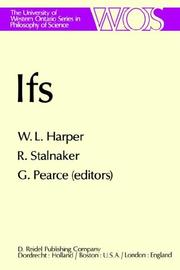
ISBN: 9027711844 9027712204 9400991177 9789027711847 Year: 1981 Volume: 15 Publisher: Dordrecht Reidel
Abstract | Keywords | Export | Availability | Bookmark
 Loading...
Loading...Choose an application
- Reference Manager
- EndNote
- RefWorks (Direct export to RefWorks)
Logic --- Philosophy of language --- Mathematical logic --- Philosophy of science --- Probability theory --- Conditionals (Logic) --- Probabilities. --- Decision making. --- Chance. --- Time. --- Conditionnels (Logique) --- Probabilités --- Prise de décision --- Hasard --- Temps --- Probabilities --- Decision Making --- Chance --- Time --- Decision making --- Deciding --- Decision (Psychology) --- Decision analysis --- Decision processes --- Making decisions --- Management --- Management decisions --- Choice (Psychology) --- Problem solving --- Hours (Time) --- Geodetic astronomy --- Nautical astronomy --- Horology --- Probability --- Statistical inference --- Combinations --- Mathematics --- Least squares --- Mathematical statistics --- Risk --- Conditional statements (Logic) --- Grammar, Comparative and general --- Fortune --- Necessity (Philosophy) --- Conditionals (Logic). --- Probabilités --- Prise de décision
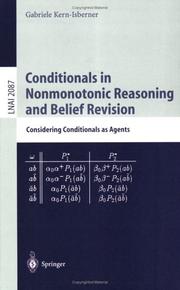
ISBN: 3540423672 3540446001 9783540423676 Year: 2001 Volume: 2087 Publisher: Berlin, Heidelberg : Springer Berlin Heidelberg : Imprint: Springer,
Abstract | Keywords | Export | Availability | Bookmark
 Loading...
Loading...Choose an application
- Reference Manager
- EndNote
- RefWorks (Direct export to RefWorks)
Conditionals are omnipresent, in everyday life as well as in scientific environments; they represent generic knowledge acquired inductively or learned from books. They tie a flexible and highly interrelated network of connections along which reasoning is possible and which can be applied to different situations. Therefore, conditionals are important, but also quite problematic objects in knowledge representation. This book presents a new approach to conditionals which captures their dynamic, non-proportional nature particularly well by considering conditionals as agents shifting possible worlds in order to establish relationships and beliefs. This understanding of conditionals yields a rich theory which makes complex interactions between conditionals transparent and operational. Moreover,it provides a unifying and enhanced framework for knowledge representation, nonmonotonic reasoning, belief revision,and even for knowledge discovery.
Nonmonotonic reasoning. --- Conditionals (Logic) --- Nonmonotonic reasoning --- Computer Science --- Engineering & Applied Sciences --- Conditionals (Logic). --- Conditional statements (Logic) --- Non-monotonic reasoning --- Computer science. --- Mathematical logic. --- Artificial intelligence. --- Computer Science. --- Artificial Intelligence (incl. Robotics). --- Mathematical Logic and Formal Languages. --- Grammar, Comparative and general --- Logic --- Reasoning --- Artificial Intelligence. --- Informatics --- Science --- AI (Artificial intelligence) --- Artificial thinking --- Electronic brains --- Intellectronics --- Intelligence, Artificial --- Intelligent machines --- Machine intelligence --- Thinking, Artificial --- Bionics --- Cognitive science --- Digital computer simulation --- Electronic data processing --- Logic machines --- Machine theory --- Self-organizing systems --- Simulation methods --- Fifth generation computers --- Neural computers --- Algebra of logic --- Logic, Universal --- Mathematical logic --- Symbolic and mathematical logic --- Symbolic logic --- Mathematics --- Algebra, Abstract --- Metamathematics --- Set theory --- Syllogism

 Search
Search Feedback
Feedback About UniCat
About UniCat  Help
Help News
News